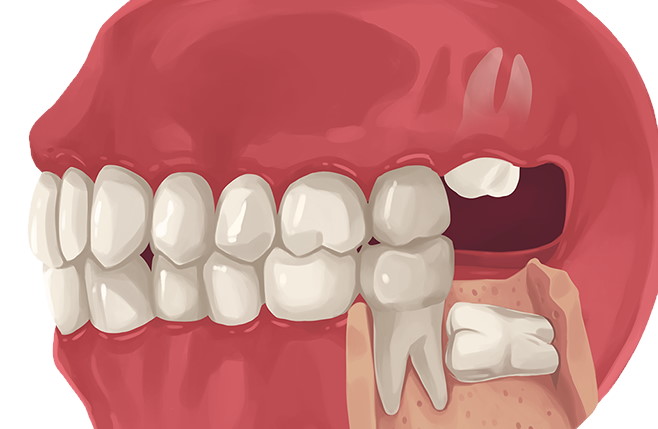Wisdom tooth extraction

Wisdom tooth extraction
Wisdom tooth refers to a third molar that develops at the back of the mouth and does not have enough room to emerge usually. When a wisdom tooth gets impacted, it can damage other teeth, cause pain and other problems. Not necessarily all wisdom teeth get affected, but if someone has an impacted wisdom tooth causing trouble, they can remove it to avoid further complications and pain.
Symptoms:
When an impacted wisdom tooth gets infected, the symptoms are –
- Bleeding or tender gums
- Swollen jaw
- Having Bad breath
- Red and swollen gums
- Change in taste
- Difficulty while opening mouth
Complications:
The impacted wisdom teeth can cause several complications in the mouth.
Decay:
Impacted wisdom teeth are generally at high risk of decay than other teeth as they are harder to clean, and food gets trapped in there, which creates bacteria.
Cysts:
The sac where the wisdom teeth develop can fill with fluid and form cyst that can affect and damage the jawbone, nerves, and teeth. In rare cases, tumors can also develop.
Gum disease:
The risk is very high of developing inflammatory and painful gum conditions because of impacted wisdom teeth. This condition is called pericoronitis.
Damaging other teeth:
The risk of infected the second molar area is increased if the wisdom teeth push against it. This pressure can create problems with other teeth and need orthodontic treatment to straighten other affected teeth.
When to call the dentist after extraction:
After removing the wisdom teeth successfully, there might be situations that will need the dentist’s attention again.
- Fever
- Excess bleeding
- Severe pain even after taking pain mediations
- Pus in the socket
- Loss of feeling for a long time
- Nasal discharge bleeding
- Difficulty in breathing and swallowing
- If the swelling gets terrible after 2-3 days
- If the sour taste does not go away after salt water rinse
